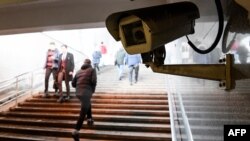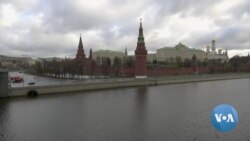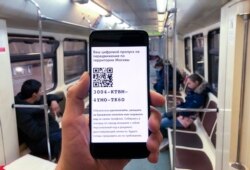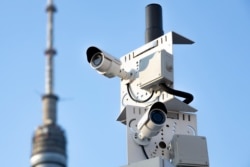In the age of COVID-19, where does the line between security, privacy, and freedom lie?
The question sits at the heart of a debate in Russia, where authorities are preparing rollout of new digital "social monitoring" tools to battle the spread of the contagion.
For now, the new monitoring measures apply only to Moscow — the epicenter of the Russian outbreak, with the vast majority of the country's cases, which in the first week of May was rapidly rising.
Amid the darkening epidemiological picture, Moscow Mayor Sergei Sobyanin insists the city has little option but to use technology to help stem the tide.
"When we talk about the health and lives of an enormous amount of people, there's no choice," Sobyanin wrote in a statement implementing the measures, which roll out this week.
But in a society with painful memories of surveillance and spying during the grimmest years of Soviet repression, the new social controls are not to be taken lightly, government critics say.
Opposition and digital rights activists maintain that in President Vladimir Putin's Russia — where the push for national ‘stability' has too often trumped individual rights — new surveillance tools provide the country's powerful security services with new weapons and little, if any, oversight.
Beyond the quarantine
As the coronavirus has raced from its initial epicenter in China to countries across the globe, the world's governments have all raced to come up with solutions. Moscow — like New York, London, and other major cities — has been on the front line with the bulk of infections. Officials are taking some familiar steps.
Under self-isolation restrictions introduced in March, a majority of the city's 12 million-plus residents now spend most time indoors. Exceptions are allowed for trips to the supermarket or pharmacy, taking out the trash or briefly walking the dog.
Combined with a month-long paid work stoppage introduced by Putin nationwide, the restrictions have reduced bustling Moscow's usual hum to an eerie quiet.
Authorities have made no secret of their frustration with residents who ignore the rules — particularly those at high risk for COVID-19 who are under mandatory quarantine.
Police say they've made hundreds of arrests and issued fines to violators. Still, city officials said a more thorough approach is warranted as spring beckons and the infections continue.
That is where technology – and controversy – comes in.
Muscovites suspected of having the coronavirus will have their movements tracked through a mandatory smartphone app. For those who don't own a phone, the city said it will issue loaners.
"The main goal is, together with the patient, encourage that he does not go outside," Eduard Lysenko, the head of the city's technology department, said in an interview with the Echo of Moscow radio.
Only the monitoring doesn't stop there.
Moscow residents would also be obligated to register for a government-issued QR code – a matrix bar code containing personal data – that Russians must present to police upon request, either on their smartphones or in printed form.
Authorities have yet to clarify what private information the code would access but say they're already working on ways to explain the technology to the elderly and less tech-savvy city residents.
Facial recognition, mask included
The new tools will merge with Moscow's existing surveillance systems — well-tuned patchworks that were meant to secure public safety during major sporting events, such as the World Cup in 2018 and the 2014 Sochi Olympics.
But where once the mission was to protect rowdy fans — or track unauthorized protests by government opponents — the new goal is to track an invisible enemy.
Moscow's network of 170,000 street cameras and facial recognition software now target possible coronavirus carriers who stray from their homes and/or quarantines, say authorities. The software's developers say it's been adapted to identify individuals in protective masks.
A further catchall is phone, credit card, and geotagging data collected by and provided courtesy of Russia's telecom providers under earlier mandates.
Collectively, the goal is "that there is no dark corner or side street left" to hide, said Oleg Barabanov, Moscow's police chief.
The new digital normal has left some feeling safer.
"Unfortunately, it's a necessity. A necessity to save lives and the health of many Muscovites, and overcome this disaster as fast as possible and return to normal life," Nicholas Danilov, a designer who wrote about the issue on Medium.
Danilov said city residents should embrace the QR-codes on everything, including clothing, in an effort to beat the outbreak.
Health experts agree that the curbs and surveillance are justified – if temporary and administered legally.
Any restrictions "should be commensurate with the risk and should be time limited," Melita Vujnovic, the head of the World Health Organization's mission in Russia, said in an interview. "These tools can be helpful as long as they're used in the appropriate way."
Digital protection? Or prison?
Government critics have their doubts.
"If it happens in accordance with law and civilian control, then these separate measures during a pandemic are justifiable," said Artem Kozlyuk of Roskomsvoboda, a non-government organization that tracks online freedoms in Russia.
"But in Russia, it's always done behind closed doors. There's a danger that after all this is over, the authorities won't want to put these tools away," he told VOA.
Putin's Russia has seen as steady erosion of internet freedoms in the name of security. Anti-terrorism laws already give state security services broad leeway to access personal data.
Kozlyuk said the question with the new data gathering is where the information goes.
"Our security services have a bad track record," he said. "Personal data regular ends up on the black market. It happens all the time," adds Kozlyuk, noting the practice invites blackmail schemes.
Members of Russia's opposition are also raising the alarm. The Soviet KGB is long gone, they say, but Russia's present day FSB routinely surveils opposition members using stakeouts, phone taps and computer hacks.
The government has also made wide use of pressure on the country's Internet and telecom providers to block Internet access amid unauthorized protests, or even sanctioned rallies, in Moscow and other parts of the country.
Those successes have the Kremlin exploring a national "kill switch" — aimed, argue its proponents, at preserving Russia's "digital sovereignty."
Critics have another description: "digital concentration camp."
"If they have created it, they will never allow themselves to turn it off. It's too tempting," Leonid Volkov, a chief strategist to opposition leader Alexey Navlany, who used the term to describe the Russia's surveillance state.
"The life of a regular person in Moscow will become what the life of a member of the opposition used to be," Volkov said. "And the opposition – our lives will become harder still."








